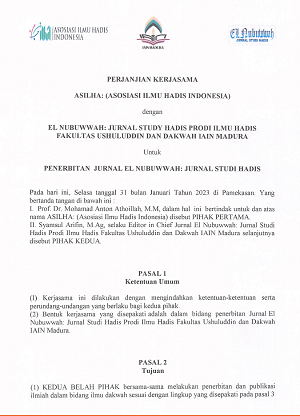Fenomena Khalwat Pasca Khitbah di Masyarakat Desa Bluto Kabupaten Sumenep
 Abstract views: 217
,
Abstract views: 217
,
 PDF downloads: 337
PDF downloads: 337
Abstract
This research aims to examine the phenomenon of khalwat that often occurs in society where the engagement phase is the first step of taaruf before entering marriage. During this period there are other things that must be considered by the prospective bride and groom and their parents, namely regarding the ethics of association during the khitbah (engagement) period. The ingredients in the customary practice of the engagement community are considered as cultural legality where the prospective spouses have considered mahrom with khalwat (to be alone) which is allowed by their parents. Although in reality this is wrong because it violates islamic law. This article explains the khalwat phenomenon that occurs in commuity, especially in Bluto village, Sumenep Regency. This reseach is included in empirical legal research methods. As for the primary data sources, they were obtained directly from the public through an interview process and secondary data were sourced from literacies in books, jounals, articles, and hadith related to the theme of this article. Data collection techniques se have khalwat with the opposite sex who are not mahram (fiance) considered normal as a form of introduction or approach to mutual understanding between partners before entering into marriage as long as this is still at a reasonable stage and when viewed from a hadith perspective and the Al-Qur’an seclusion with non-mahrams is not permissible or unlawful even if the status has been preached.
Downloads
References
A Partanto Pius dan M. Dahlan al-Barry. Kamus Ilmiah Populer. Surabaya: Arkola. 2001.
Abidin Slamet. Fiqh Munakahat I. Bandung, Pustaka Setia, 1991.
Az-Zuhaili Wahbah. Fiqih Islam wa Adillatuhu Jilid 9. Jakarta: Gema Insani. 2011.
Aziz Dahlan Abdul. Ensiklopedi Hukum Islam. Jakarta: Ichtiar Baru van Hoeve. 1996.
Chamidi Ya’cub. Menjadi wanita shalihah dan mempesona. Jakarta: Pustaka Media, 2019.
Fu’ad Abdul Baqi, Muhammad. shahih bukhari muslim. Yogyakarta: Lontar Mediatama, 2017.
Hajar al-Asqalani Ibnu. Fath al-Baari, juz.9. Dar Misri litiba’ah, 2001.
Hanbal bin Ahmad. Al-Musnad, Juz I. Dar al-Fikr, tt..
Kementerian Agama RI. Al-Qur’an dan terjemahannya.
Katsir Ibnu. Tafsir Ibnu Katsir jilid 1. Bogor: Pustaka Imam Asy-Syafi’i, 2004.
Kisworo Budi. Zina dalam kajian teologis dan sosiologis , jurnal hukum Islam Vol. 1. No.1, 2016, 5.
Khatimah, Husnul. "Revitalisasi Nilai-Nilai Khitbah Didalam Hadits Sebagai Upaya Menjaga Kemuliaan Perempuan (Analisis Hadits Tematik)." El-Nubuwwah: Jurnal Studi Hadis 1, no. 1 (2023): 30-45.
Mansur bin Muhammad. Lisanul Arab jilid 1. Beirut: Dar al-Mashadir, tt.
Muhammad bin Umar al-Safiri al-Syafi’i. Al-Majâlis Al-Wa’zhiyyah, Cet. I. Beirut: Dâr al-Kutub al-Ilmiyyah, 2004.
Muhammad Yusuf Achmad , dkk, Ensiklopedi tematis ayat Al-Qur’an dan Hadis. Jakarta: Widya Cahaya. 2014.
Muslim, Terjemah Shohih Muslim. Jakarta: Bulan bintang, 2016.
Salim Bahammam Fahad. Panduan Wisatawan Muslim Cet. I. Jakarta: Pustaka al-Kautsar. 2011.
Saebani Beni Ahmad. Fiqh Munakahat. Bandung: Pustaka Setia. 2001.
Syarifuddin Amir. Hukum Perkawinan Islam di Indonesia. Jakarta: Kencana. 2006
Usammah. Takzir dalam hukum pidana Islam. Jakarta: CV mitra cendekia media, 2023.
Wignjodipoero Soerojo. Pengantar Dan Asas-Asas Hukum Adat. Jakarta: Gunung Agung. 1995.
Yatimin. Etika seksual dan penyimpangannya dalam islam. Pekanbaru : Uin Suska,2003.
Copyright (c) 2023 El Nubuwwah: Jurnal Studi Hadis

This work is licensed under a Creative Commons Attribution-NonCommercial 4.0 International License.






















